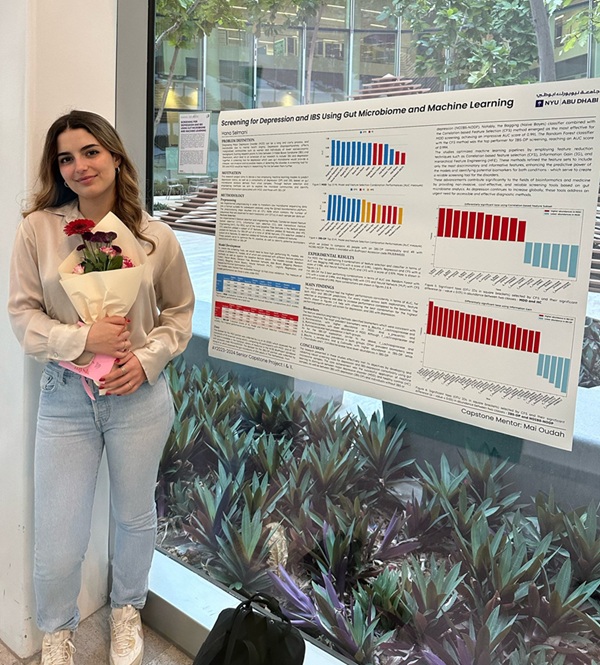By Eni Muça
Hana Selmani, a young woman from Skopje, has just published her first scientific study on a groundbreaking program that uses artificial intelligence to detect and diagnose depression — with an impressive accuracy rate of 99%.
Hana graduated in Computer Science at New York University Abu Dhabi. Having attended Nova International Schools in Skopje for high school, she had long shown interest in technology and computer sciences. In Abu Dhabi, she worked alongside Professor Mai Oudah, head of the Bioinformatics Lab. Under her supervision, Hana chose to explore how data from the microbiome — the community of microorganisms in the human gut — could help detect mental illnesses. This marked the beginning of her thesis project, which eventually evolved into a scientific publication.
Her project focuses on microbial differences that distinguish people with depression from those without, using machine learning tools.
In the study, machine learning techniques were used to build a predictive model based on microbiome data from the gut. Hana and her team worked with a laboratory dataset containing microbiome profiles from 43 individuals diagnosed with depression and 47 without. The computer model was trained to differentiate between these two groups based on the frequency of various bacteria present in their gut. To enhance performance, feature selection techniques were employed to choose the 30–50 most informative and discriminatory bacteria. These identified bacteria may also serve as new biomarkers for depression, suggesting potential biological links for further studies.
The model’s performance was remarkably high. According to test results, it accurately classified 99% of depression cases. This result aligns closely with the AUC score of 0.991 (99.1%) reported in the study published by Springer. The main goal of the model is to create an effective, accessible, and affordable diagnostic tool for depression screening — features that are essential, especially considering the financial challenges often faced in healthcare systems.
Hana explains:
“The final performance is almost perfect, with a 99% accuracy rate. The motivation behind this project was to develop an effective, accessible, and low-cost tool.”
In addition to its high accuracy, the program makes significant contributions to science: it serves as a bridge between bioinformatics and psychology, merging AI and microbiome studies with mental health research. The main benefits of the program include:
Interdisciplinary studies:
Her research links machine learning with microbiome data and depression, while using advanced optimization techniques for the models (feature selection/engineering).
New biomarkers:
The program identifies a profile of 30–50 specific microbes that differentiate individuals with depression. These microbes hold great potential as biomarkers — they can be further studied by biochemists to better understand their possible impact on mental health.
Accessible diagnosis:
The tool offers doctors and patients an initial, affordable depression screening option. Given that traditional psychological diagnoses are often expensive and inaccessible to many, especially in regions with limited healthcare resources or specialists, Hana’s platform could provide meaningful relief.
Despite the success of her classification model, Hana emphasizes that it is only a diagnostic aid — the final diagnosis must still be made by a qualified psychiatrist. Another challenge remains with interpretation: although the model can identify depression-related microbiome patterns, it is still unclear whether these bacterial changes cause depression or result from it.
“The program detects depression with high accuracy, but it does not explain the link between the microbiome profile and depression — does depression influence the microbiome or does the microbiome cause depression? These are questions for further biological research,” Hana notes.
For this reason, the biomarkers identified by her model may serve as a starting point for future biological experiments.
Looking ahead, Hana plans to continue her academic career with a master’s degree in the UK. She is already in the process of publishing her second scientific article, this time in the field of electronic chip security. She hopes that her AI-based project will eventually be adopted by technology companies or public health institutions, in order to provide widespread benefits.

0 comments